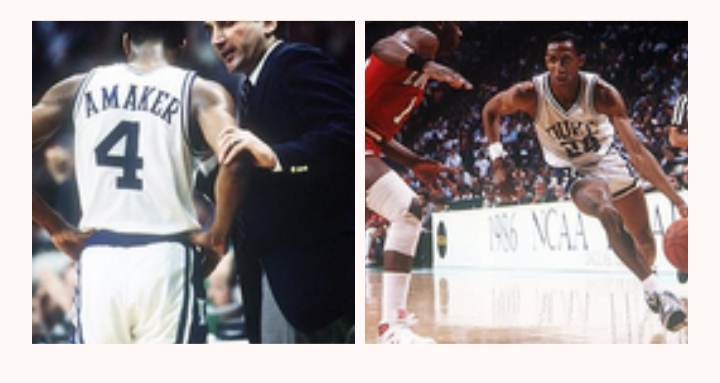Before the Championships and the Glory: How the 1986 Duke Blue Devils Overcame Adversity, Captured a Nation’s Attention, and Laid the Foundation for One of College Basketball’s Greatest Dynasties
Thirty years before Mike Krzyzewski became a living legend with five national championships and 12 Final Fours under his belt, there was a young, unproven coach trying to rebuild a struggling program. That program was Duke. That season was 1985-86. And that team—led by Johnny Dawkins, Jay Bilas, Tommy Amaker, Mark Alarie, and David Henderson—would forever alter the course of college basketball history.
The 1986 Blue Devils weren’t born champions. Their story began in adversity. The seniors who would ultimately carry Duke to its first Final Four under Coach K had once finished their freshman season 11-17, including a dismal 3-11 record in the unforgiving Atlantic Coast Conference (ACC). But rather than fade into mediocrity, they grew stronger, more resilient. Hardened by early defeats and united by a fierce desire to win, they returned with experience, hunger, and an unwavering belief in each other.
By the end of the 1985-86 season, they had transformed into something extraordinary.
That team would go on to win a school-record 37 games, capturing both the ACC regular-season and tournament titles. They entered the NCAA Tournament as the top-ranked team in the country and surged through the bracket with heart, hustle, and star power. They toppled David Robinson’s Navy squad to earn a trip to the Final Four in Dallas, then knocked off No. 2 Kansas to earn a place in the national championship game.
Though they would fall just three points short to Louisville, 72-69, in a game that still stings decades later, their impact would resonate far beyond the scoreboard.
Laying the Foundation for a Dynasty
That Duke team wasn’t just trying to win a championship—they were building something bigger: a culture, a standard, a roadmap. Coach Krzyzewski would later call them “the rock of our program.” They were the proof of concept that Duke could not only compete with the elite, but define what it meant to be elite.
“They were a team worthy of winning it all,” Krzyzewski recalled. “Where they came from—11-17 to 37-3—is really one of the great journeys in the history of college basketball.”
Johnny Dawkins, the team’s leading scorer and emotional leader, who would later become a coach himself, reflected: “Everything has a beginning, and that was the beginning of what Coach has put together. Who could have dreamed what would happen after that?”
Jay Bilas, now an ESPN analyst, echoed the sentiment. “We talked about laying a foundation, but we wanted to win for ourselves too. Still, looking back, it’s an honor to have been a part of the start of something so special.”
A Brotherhood Forged in Battle
They were more than just teammates—they were pioneers of what would become the Duke Basketball Brotherhood. In the years that followed, they would remain close, often texting and reminiscing about the season that changed everything.
“We were fortunate to be at the beginning,” Dawkins said. “I’ll carry that experience with me for the rest of my life. I think it made me a better person.”
Tommy Amaker, now head coach at Harvard, said that being part of that foundational group helped shape the kind of culture he later built in Cambridge. “That experience taught me how powerful being part of the beginning can be. That story became a tool in our recruiting and building process at Harvard.”
Even the heartbreak of losing in the title game carried lessons that would last a lifetime. “I’ve never rewatched that game,” Dawkins admitted. “I’m still getting over that one. You can tell 30 years later. There’s a good chance I won’t ever get over it.”
The Launchpad to Greatness
Though the championship eluded them, their effort lit the spark for Duke’s dominance. In the nine years that followed, the Blue Devils returned to seven Final Fours and won back-to-back titles in 1991 and 1992. The 1986 squad made belief possible—for the players, the coaches, and the fans.
“Getting to the Final Four and playing for a national title is a stamp that you can do it,” said Krzyzewski. “That ’86 team showed us the way.”
Jay Bilas captured it best: “If we had won it all, we’d be remembered among the greatest teams of all time. But even without that title, we know what we were. And we’re proud of it. I get to say I played for Coach K. I get to say Johnny Dawkins was my teammate. That’s honor enough for anybody.”
A Legacy That Endures
Today, when you walk the halls of Cameron Indoor Stadium, or watch another Duke team take the floor in March, you’re seeing echoes of 1986. You’re seeing the legacy of players who refused to accept mediocrity. Who turned pain into progress, and defeat into direction. Who helped a young coach become a legend.
They didn’t get the trophy. But they started the dynasty.
And in the grand story of Duke basketball, they will always be remembered—not just as the first team to reach the Final Four under Coach K, but as the team that showed Duke how to become great.





























